
Amazon workers at a warehouse in Alabama are getting closer to organizing a union vote, laying the groundwork for establishing the first union representation at an American Amazon unit.
Workers at an Amazon fulfillment center in Bessemer, Alabama, outside Birmingham, notified the National Labor Relations Committee last month that they plan to hold elections to set up a bargaining unit for the Retail, Wholesale and Department Store Union. . The NLRB said on Thursday it had found “sufficient presentation” to allow the vote, rejecting Amazon’s claims that the union did not get enough support.
At a meeting on Friday, Amazon and the union continued to disagree on the size of the potential bargaining unit and what employees should be eligible to vote on. The meeting is also meant to resolve details, such as when a union vote will take place and how it will take place. The hearing may take several days.
“The parties to this case have different positions on certain job classifications as to whether these employees should be included or excluded from an appropriate bargaining unit,” said Terry Combs, assistant regional director for the Atlanta region. NLRB.
To get the green light for the election, NLRB wants 30% of workers to sign union authorization cards or petitions. In its petition, the union said the bargaining unit would cover 1,500 full-time and part-time workers at the facility.
Amazon claimed in the documents presented to NLRB that the facility has more than 5,700 people, suggesting that the union gathered fewer signatures than was needed to move forward with the election.
It is unclear how Amazon came to this total. Amazon said in a 2018 announcement that it will employ 1,500 people at the facility.
Heather Knox, a spokeswoman for Amazon, said Amazon has created more than 5,000 full-time jobs in Bessemer, with an average salary of $ 15.30 per hour, health care and other benefits.
“We do not believe that this group represents the majority of our employees’ opinions,” Knox said in a statement. “Our employees choose to work at Amazon because we offer some of the best jobs available wherever we work and we encourage anyone to compare our overall salaries, benefits and work environment with any other company with similar jobs.”
An RWDSU spokesman declined to comment.
The unions organized part of Amazon’s European workforce, but no American unit successfully formed or joined a union. A successful union action in Alabama would be a revolutionary change for the country’s second largest employer, which has more than 1.37 million Amazon and Whole Foods employees in the United States.
The effort to unionize in Alabama comes as Amazon experienced growing disruption to warehousing and delivery labor during the pandemic. In recent months, some employees have staged protests to demand safer working conditions, created online petitions to draw attention to their concerns and formed new groups of workers.
A website promoting the Alabama campaign says a union would help employees advocate for changes related to safety, pay, disciplinary proceedings and other workplace issues.
“Amazon has built up decades of increasingly daring and aggressive attacks on workers’ rights that have dramatically eroded union density, affected working conditions and lowered the standard of living for many workers. And it doesn’t stop,” the website reads. the web. “Our union will not return until Amazon is held accountable for these much more dangerous work practices.”
Workers ‘experts say the hearing is just the beginning of what is likely to be a long way ahead for Alabama workers’ union action. Amazon has taken an aggressive stance against unions in the past, clearly expressing its opposition to them with workers.
But it may take a single successful campaign in an Amazon unit to inspire others to follow suit.
“If he succeeds, I think he will send a message that there is hope for the organization of workers,” said Tom Kochan, a professor of industrial relations, labor and employment at MIT. “But it’s a big uphill battle, because you have to organize a warehouse, which requires an enormous amount of resources.”